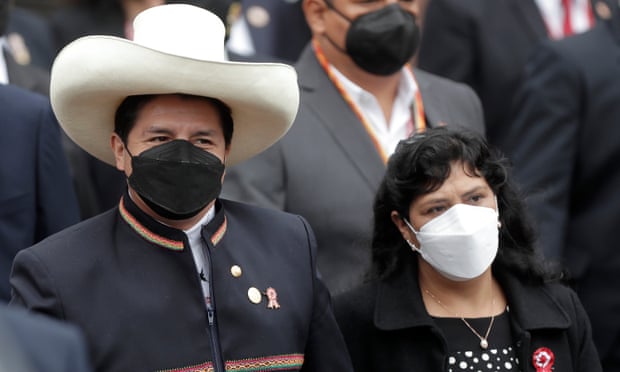Leftwing rural teacher Pedro Castillo sworn in as president of Peru
Castillo will face deeply divided Congress who will make it challenging for him to fulfil campaign promise to aid poor
Pedro Castillo, a leftwing political novice who has promised to be a champion of his country’s poor, has been sworn in as Peru’s president.
The rural teacher, who has never held political office before, was sworn in less than two weeks after he was declared the winner of the 6 June runoff election. He is Peru’s first president of peasant origin.
In a ceremony in the capital of Lima, Castillo made a commitment “for God, for my family, for my peasant sisters and brothers, teachers, patrolmen, children, youth and women, and for a new constitution”. He then sang the national anthem, taking off his signature hat and placing it over his heart.
Castillo’s presidency follows that of Francisco Sagasti, whom Congress appointed in November to lead the South American nation after weeks of political turmoil.
Castillo, who until days ago lived with his family in an adobe home deep in the Andes, will face a deeply divided Congress that will make it extremely challenging for him to fulfil campaign promises to aid the poor, who are estimated to make up about a third of Peru’s population. His political skills will be immediately tested and his ability to reach agreements could even determine if Congress allows him to finish his term.
Castillo defeated his opponent, the rightwing career politician Keiko Fujimori, by just 44,000 votes. Fujimori claimed fraud, challenged about 500,000 votes, asking for half to be annulled, and called on officials at Peru’s electoral board to re-examine ballots – despite the lack of evidence of wrongdoing.
Peru’s poor and rural citizens supported Castillo and his slogan “no more poor in a rich country”, while the elites favoured Fujimori, the daughter of the jailed 1990s autocrat Alberto Fujimori. He stunned voters and observers by rising from a pool of 18 candidates and advancing to the runoff to first place.
Castillo’s initial proposal to nationalise the nation’s mining industry set off alarm bells among business leaders. While that stance has softened, he remains committed to rewriting the constitution that was approved under the regime of Fujimori’s father.
Peru is the second largest copper exporter in the world and mining accounts for almost 10% of its GDP and 60% of its exports. Its economy has been crushed by the coronavirus pandemic, increasing the poverty level and eliminating the gains of a decade.
In November, Peru had three presidents in a single week after one was impeached by Congress over corruption allegations, and protests forced his successor to resign. Lawmakers then appointed Sagasti.
Thousands of small businesses have closed over the past 16 months and the political uncertainty after the election has led to the withdrawal of millions of dollars from local banks.
The pandemic has pushed Peru’s medical and cemetery infrastructure beyond capacity. It has also deepened people’s mistrust of government as it mismanaged the Covid-19 response and a secret vaccination drive for the well-connected erupted into a national scandal.
Castillo has promised Covid-19 vaccines for all Peruvians.
Castillo until recently was a rural schoolteacher in the country’s third-poorest district. The son of illiterate peasants led a teachers’ strike in 2017. He is married and has two children.
Several delegations from other countries travelled to witness Peru’s presidential transition.

